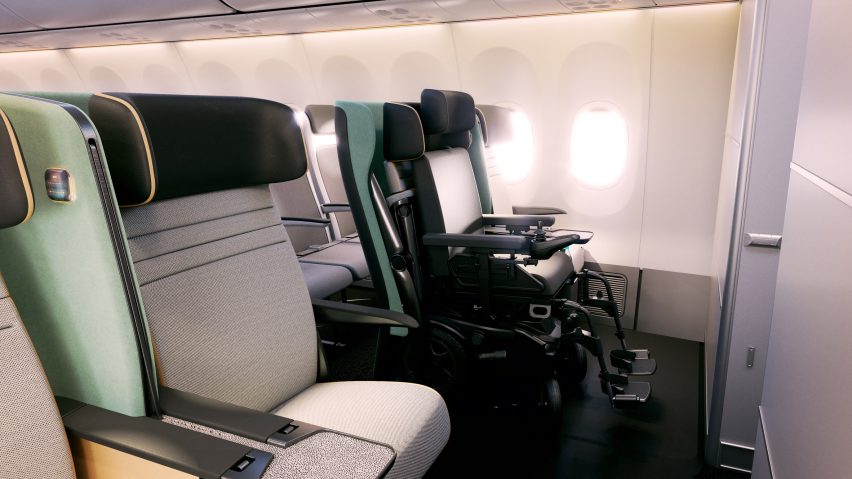PriestmanGoode has unveiled Air 4 All, an aeroplane seating system that will allow powered wheelchair users to remain in their own wheelchairs for the entire journey.
Developed by PriestmanGoode in a consortium with campaign group Flying Disabled and aircraft safety company SWS Certification, the concept is designed for commercial flights and is currently being developed into a prototype.
The aeroplane seat folds up to accommodate a wheelchair in the Air 4 All concept
The concept design looks like a standard airline seat, but the bottom flips up when required to make room for a wheelchair, with a guide track to help position the chair and an attachment system that securely fixes it in place.
If no wheelchairs require access, the seats function as regular airline seats.
PriestmanGoode says Air 4 All will allow airlines to give powered wheelchair users equal access to safe, comfortable and dignified air travel, while letting the companies retain their seat count.
"The biggest barrier in the past has been that giving greater space to passengers in wheelchairs would have reduced seat count and resulted in a loss of revenue for airlines," said PriestmanGoode chairman Paul Priestman.
"Air 4 All solves this problem and has the added benefit of enabling airlines to retain the design of their cabin on every seat, ensuring brand consistency and a cohesive brand experience for all passengers," he continued.
"Air 4 All will facilitate a smoother boarding and disembarking experience for PRMs [passengers with reduced mobility] and will also significantly reduce the number of wheelchairs that are damaged through poor handling."
PriestmanGoode's vision is for Air 4 All to work similarly to the Isofix/LATCH standards for child safety seats in passenger cars, with various wheelchair models becoming certified for flying.
Both the airline seats and wheelchairs will need to be fitted with the consortium's patented installation and attachment system for Air 4 All to work.
Another partner on the project, wheelchair manufacturer Sunrise Medical, will undertake the task of creating powered wheelchairs that are fit to fly, as well as retrofitting old models.
Eventually, the system will be opened up to all airlines and wheelchair manufacturers.
"In the same way that child seats for cars can be made by many different manufacturers and used on any type of car, our aim for Air 4 All is that it's universal," Priestman told Dezeen.
"At PriestmanGoode we design many trains, trams and buses and for all these modes of transport there are strict requirements to provide positions to allow people to travel on board whilst seated in a wheelchair."
"It is wrong that currently onboard aircraft there is no such provision," Priestman continued. "I believe the Air 4 All system has provided a solution that will at last correct this and allow wheelchair users to travel as they should like everybody else."
PriestmanGoode expects to have a prototype of Air 4 All ready in December 2021.
The initial design is for a narrow-body aircraft with two rows of two seats. It converts the front-row seats and creates a capacity for up to two wheelchairs per row.
PriestmanGoode says it is working with a subsidiary of a major airline to bring the product to market, and the long-term vision is to extend the system to other modes of travel such as rail and metro.
Flying Disabled founder Chris Wood has been campaigning for accessibility in aviation since 2015 and said the consortium was "actively working with all the necessary parties" to ensure its solution was harmonised and fit for purpose.
"Air 4 All is the first system that has been developed jointly by a design agency, a certification body and with input from the disabled community," he said.
"With a leading global wheelchair manufacturer as well as the subsidiary of a major airline on board to develop the product, it's a truly collaborative project."
PriestmanGoode is an industrial design studio specialising in transport design. Among its other recent concept designs is an autonomous taxi modelled on London's Brutalist architecture and a pandemic-proof aircraft passenger cabin with dirt trap-free surfaces.

